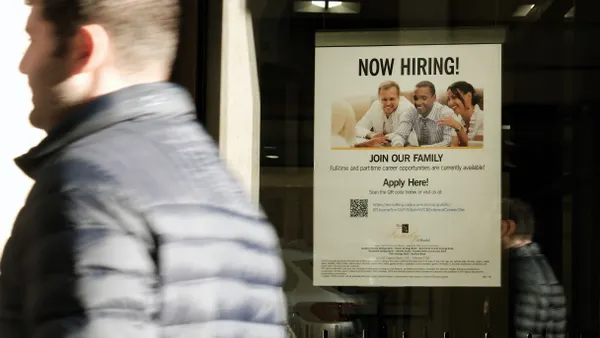Dive Brief:
- Uber and Lyft launched what the Los Angeles Times called "a public campaign" to pressure lawmakers in California to exempt them from legislation that would obligate them to treat their drivers like employees rather than independent contractors.
- Executives at the companies wrote in a San Francisco Chronicle op-ed that drivers must retain their independent contractor status for their businesses to remain viable.
- The executives suggested, however, they could improve independent work if they could "work with legislators and labor groups to find a different solution that preserves drivers' ability to work independently if they choose to do so while improving the quality and security of their work." This improvement would include bettering worker protection, forming "a new driver association... to represent drivers' interests" and "addressing driver earnings."
Dive Insight:
Business leaders will likely pay close attention to Uber and Lyft as they navigate their classification conundrum. The legislation putting boundaries on independent work changes rapidly; "We are seeing litigation on a daily basis," Ballard Spahr LLP Partner Shannon Farmer told attendees at the National Employment Law Institute's recent Employment Law Update in Washington, D.C. in early June.
For California-based ride-sharing companies and other businesses relying on independent workers, the state's year-old Dynamex ruling — which a bill due in the state Senate seeks to codify — has cast a shadow over the gig economy. With Dynamex, the California Supreme Court adopted a worker classification test for independent contractors that generally assumes workers are employees. The decision also obligated employers to show their workers meet all three of the criteria the test uses to define independent workers.
Uber and Lyft are not the only ones to point out that legislation like this could jeopardize peoples' opportunity to work the flexible jobs that gig work provides. High-profile exotic dancer Stormy Daniels wrote in the Los Angeles Times earlier this year that her independent contractor status allowed her to set her own hours.
Still, flexibility doesn't answer the criticism that Uber and Lyft drivers lack the pay, benefits and protections that employees would receive. Some localities have responded to these problems with legislation; New York City, for example, enacted a minimum wage for ride-hailing drivers. And the companies have made some effort to supply their workers with benefits. In 2018, Uber launched Uber Pro, which, among other things, granted its drivers in eight cities 100% tuition coverage for online courses through Arizona State University.










